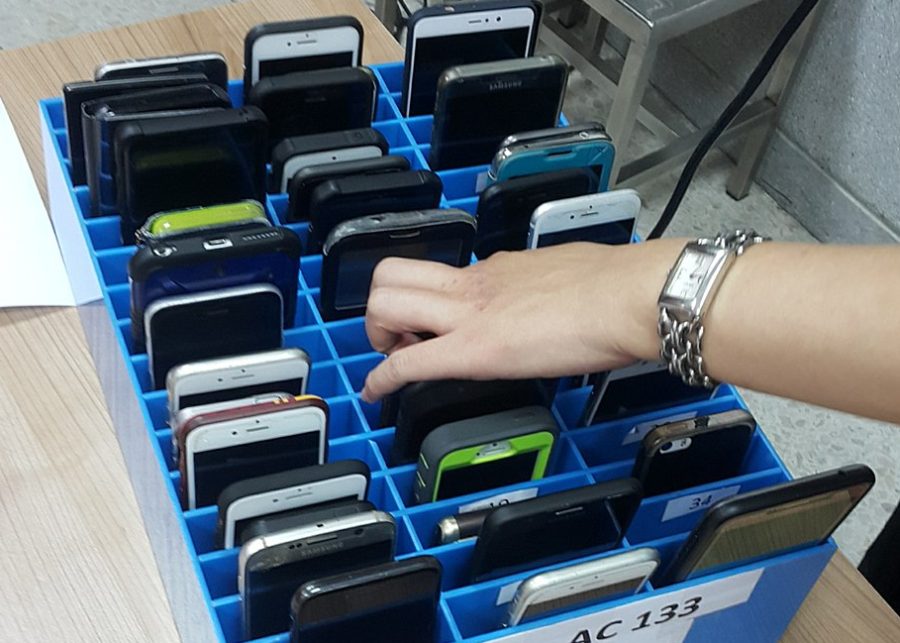Phone Caddies Incoming
June 9, 2023
Ding. You’re sitting in class, trying to absorb your teacher’s lesson about World War II, and your phone is being barraged with notifications. The dim screen illuminates with another buzz. You begin to reach for it––it is effortlessly close, sitting on the corner of your desk. You open your notifications and discreetly swipe through them. Oops. You just missed the lesson about Victory in Europe day.
Recently, Mr. Morrison, the principal of Tenafly High School, announced a new proposal to combat this issue: “As an administration, we’re going to supply every single classroom with a phone caddy. And we’re going to instruct our staff that it’s going to be school protocol that students should dock their phones upon entering every instructional classroom in the building.” The school’s aim is to implement this protocol for the upcoming fall. The administration is currently conducting a survey to figure out which classrooms do not have a phone caddy in order to determine how many need to be provided.
According to the federal National Center for Education Statistics, by 2020, 77% of schools reported prohibiting cell phones for non-academic use. “We all know cell phones are a real powerful distraction for everybody, including adults,” Morrison said. “So, the goal here is to maximize learning and to give kids a chance to put their phones aside, put their concerns aside, put their social life aside, and focus on what’s in front of them. And that’s learning, here in the building.”
Students and staff have expressed concerns regarding specific scenarios and even emergencies that would require easy access to a cell phone, to which Morrison assured, “Individual teachers can allow students to take the phones out if they have a class activity that they want to do, or if there is some kind of an emergency where a student says, ‘I need to call home.’ Of course teachers will use their discretion.”
A poll on The Echo of 222 responses, staff and students included, revealed that opinions regarding the implementation of cell phone caddies to optimize focus in classrooms is split nearly half-and-half. The majority, around 49% of participants, disagree with the usage of phone caddies, and a close 42% of participants agreed with the usage of phone caddies. Meanwhile, 9% of participants reported that they are indifferent to the subject. “I’ve been having conversations with The Big Cabinet–my teacher advisory panel–where they have advocated there should be some uniformity from classroom to classroom. So students have an expectation, no matter who their teacher is, no matter what the subject is, that the same rules are going to apply,” Morrison added. However, Morrison also referenced student opinion regarding the matter. Morrison shared, “I also talked to my student advisory panel–The Little Cabinet–about this as well. And I think a lot of students are also in favor of it. Not all, but I think a lot of kids understand; once you get a text message from your social group or even someone in your family, you’re out of being able to focus on the subject matter in front of you because you’re thinking about whatever that situation is.”
![]()
The rest of the student population certainly has its own diverse standpoints on this argument. Evan Ralske (’24) expressed an obstacle regarding the use of cellphone caddies. With a rise in digital organization services such as Notion, Ralske said, “It’s kind of annoying because most people use their phones for writing down homework and planning due dates. It’s annoying to have to remember to do that after class.”
Zachary Shammash (’24) added on to the list of concerns: “I think that the phone caddies need a better way to stay on the walls because oftentimes they will fall. And when the phone caddies fall, obviously phones are going to break and that’s a liability for the school. And until the school finds some way to mount the phone caddies, I don’t think that phone caddies should be allowed ‘cause it’s a liability. And two, I feel like phone caddies will spread germs because our phones are obviously very dirty–they’re actually more dirty than the toilet seats in the bathroom–and I think that phone caddies should also be disinfected. I don’t believe that would be that hard to do since we were disinfecting everything during Covid. Those are my two requests before phone caddies are actually initiated.”
Dayoung Ahn (’26) reminisced back to her middle school days when she was anticipating an increase of freedom in the high school. Ahn recalled, “Coming into high school, I remember one of the greatest perks was being allowed to carry our phones around, so I hope that there will be other ways for students to get off their phones during class without them being taken away.” Although she understands the argument that the administration is posing, she rebutted, “I tend to feel safer when I am closer to my phone, and I prefer classes without phone caddies.”
Emelia Lan (’25) expressed her preference for the current phone caddy situation opposed to the one being implemented in the future. Lan shared, “It shows that the school doesn’t trust us. If the teacher wants to do it, sure. But if it is required by every teacher, then no.”
Chang-Yoon Kim (’26) neither strongly agrees nor disagrees with the implementation of phone caddies. “I don’t think it’s a bad idea in order to keep students focused in class. But for the past year, I haven’t observed a large difference in the classes that use these caddies and the classes that don’t. I also believe that the students will have an increased focus in class next year even without the implementation of phone caddies, with the new Chromebook monitor system that’s being installed next year,” Kim said.
Despite the various opinions in circulation, administrators are settled on their decision of implementing mandatory phone caddies. According to the Journal of the Association for Consumer Research, the presence of your cell phone near you (even if it is turned off), significantly decreases your cognitive capacity. The future Tenafly High School approach puts this thesis to the ultimate test. Will students’ grades increase or decrease? Will students’ mental health improve or worsen? Or will students go berserk before we can even answer these questions? I guess we’ll see soon.


















































































































































